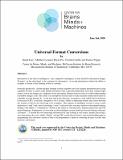| dc.contributor.author | Liao, Qianli | |
| dc.date.accessioned | 2020-06-05T00:10:28Z | |
| dc.date.available | 2020-06-05T00:10:28Z | |
| dc.date.issued | 2020-06-05 | |
| dc.identifier.uri | https://hdl.handle.net/1721.1/125680 | |
| dc.description.abstract | Information is the fuel for intelligence. Any competitive intelligence system should be information hungry. “Formats” on the other hand, is the container for information. Accessing information without the ability to
decipher its format is like drinking without a container.
From this perspective, current machine learning systems arguably have zero general information processing capability because it cannot really handle information that is presented differently from their standard input format, even if the changes are completely trivial and regular. Humans however have no trouble understanding reasonable changes at all. Thus, there is an unexplored research area to make machines understand formats in a flexible way like humans do. As the first step in this direction, we propose a task called Universal Format Conversions (UFC): a task that is designed to test a system’s ability to understand formats and convert between any formats of data by just observing a few examples. This requires an intelligent system to extract useful information (“read”) and convey knowledge (“write”) with novel data structures and text with minimal training, leading to the ability to “communicate” flexibly in the format of structured data, artificial expressions and even natural language. Furthermore, we note that an ideal intelligent system should go beyond working with pairs of formats — it should discover interesting information by only looking at one format, namely possessing a zero-shot pattern discovery ability. Finally, solving UFC would directly lead to real-world breakthroughs in programming since enormous amount of time of all programmers is spent on converting all types of ad hoc data structures and formats. | en_US |
| dc.description.sponsorship | This work was supported by the Center for Brains, Minds and Machines (CBMM), funded by NSF STC award CCF - 1231216. | en_US |
| dc.language.iso | en_US | en_US |
| dc.title | Universal Format Conversions | en_US |
| dc.type | Article | en_US |
| dc.type | Technical Report | en_US |
| dc.type | Working Paper | en_US |
| dc.type | Other | en_US |
| dc.contributor.department | Center for Brains, Minds, and Machines | |
